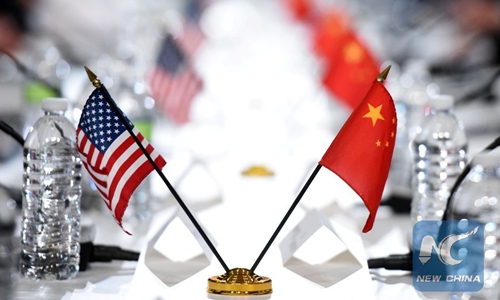US should not 'commit suicide' by pushing decoupling with China
By GT staff reporters Source:Global Times Published: 2020/6/9 21:01:34

File photo taken on November 23, 2016 shows the national flags of the United States and China during the 27th Session of the China-US Joint Commission on Commerce and Trade in Washington DC, US. Photo: Yin Bogu/Xinhua
A looming steep US recession is sending a warning to Washington to rekindle its relations with Beijing and avoid "committing suicide" by pushing a decoupling between the world's two largest economies, experts said.
Amid the coronavirus outbreak and raging protests, the world's largest economy is in earnest need of China -- with a massive market and the implementation of the phase one trade agreement - as it strives for an economic recovery.
The US-based National Bureau of Economic Research (NBER) said on Monday (US time) that US economic activity peaked in February, ending a 128-month expansion that was the longest in US history.
The downturn is the first since 2009, when the last recession ended. Recessions are usually described as two consecutive quarters of GDP contraction.
In the first quarter, the US economy contracted by 5 percent year-on-year. Some economists have said that second-quarter US GDP could shrink more than 50 percent as the pandemic continues and protests rocking US cities spread the virus more quickly.
The NBER's outlook comes as the Trump administration continues decoupling with China - from technology and education to the financial sector - to cover up its mishandling of the pandemic.
Huang Qifan, an influential economist and former mayor of Southwest China's Chongqing Municipality, said at a forum on Monday that China-US relations have entered the "hardest period" since the founding of the People's Republic of China.
"China counts heavily if the US economy is to climb up from the bottom… Pushing decoupling with China is a self-destructive move that will only make the US derail from a sound economic recovery," Li Yong, deputy chairman of the Expert Committee of the China Association of International Trade, told the Global Times on Tuesday.
If Washington insists on a "new cold war philosophy" against China, the US economy could be mired in a protracted recession that could last throughout the year, analysts said.
Gao Lingyun, an expert close to the Chinese government, told the Global Times on Tuesday that the phase one trade deal with China matters a lot for the US to restart its economy, not only in light of how it could stabilize US exports.
Under the deal signed in January, Beijing is expected to buy tens of billions of dollars more in US agricultural products in 2020 compared with the level of 2017, according to Gao.
China bought 32.9 million tons of soybeans from the US in 2017, customs data showed.
"The bulk of purchases by China will give the US a respite from a dive in exports amid a global standstill. More importantly, Trump also craves more agricultural purchases from China as it will help him win votes from swing states, where most US farmers are based, for the upcoming US presidential election," Gao noted.
He also warned that any retreat of the US side from the phase one deal will bring retaliation by China, such as curbing the exports of rare earths, which would only exacerbate the US' economic woes.
In a move that signaled a further tech decoupling with China, the US in May added 33 Chinese entities beyond Huawei to a trade blacklist.
Analysts said that China's vibrant market is vital for the US technology sector, a pillar of US economic competitiveness, as revenue from Chinese companies sustains hiring as well as research and development of US technology leaders such as Apple and Qualcomm.
RELATED ARTICLES:
Posted in: ECONOMY